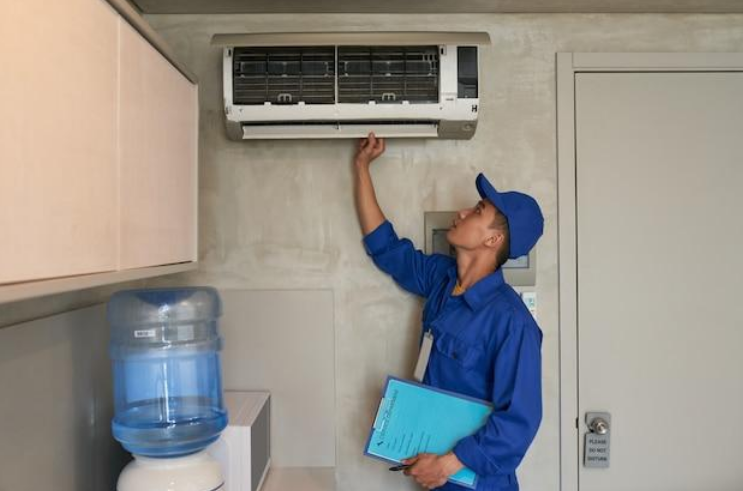Choosing the right air conditioning (AC) system is crucial for maintaining comfort and efficiency in your home, especially as global temperatures rise. Whether you’re upgrading an outdated unit or installing one for the first time, the right AC system can help improve air quality, save on energy bills, and ensure year-round comfort. This guide walks you through essential tips for selecting the perfect air conditioning system tailored to your needs.
1. Understand Your Cooling Needs
The first step in choosing an AC system is assessing your specific cooling requirements. Consider factors like the size of your home, the number of rooms, ceiling height, insulation quality, and even your local climate. For instance, a small apartment may only need a window unit or portable AC, whereas a larger home might require a central air system or ductless mini-split.
A common mistake homeowners make is purchasing an oversized unit thinking it will cool faster. In reality, an AC that’s too powerful will cycle on and off frequently, increasing wear and tear and reducing energy efficiency. On the other hand, an underpowered unit will struggle to cool effectively. Always rely on a professional load calculation to determine the correct BTU (British Thermal Unit) capacity.
2. Types of Air Conditioning Systems
There are several types of AC systems to consider:
- Window Units: Ideal for single rooms or small apartments. They’re affordable and easy to install but may block windows and lack modern features.
- Portable Units: Flexible and easy to move, but they can be noisy and less efficient.
- Ductless Mini-Split Systems: Great for homes without ductwork. These offer energy efficiency, quiet operation, and zone-based cooling.
- Central Air Conditioning: Best for larger homes. Offers consistent cooling throughout and is often integrated with heating systems.
- Hybrid Systems: Combine electric and gas power to offer improved energy savings during moderate weather conditions.
Each type has pros and cons, so it’s essential to align your choice with your home’s architecture, budget, and comfort preferences.
3. Energy Efficiency Matters
Air conditioners can consume a significant portion of your monthly electricity bill. That’s why it’s vital to look for units with high Seasonal Energy Efficiency Ratio (SEER) ratings. The higher the SEER rating, the more energy-efficient the system is.
Inverter technology is another feature worth considering. It allows the AC to adjust its power consumption based on the room’s temperature, reducing energy usage and maintaining consistent comfort levels.
Look for Energy Star-certified models—they meet or exceed energy efficiency guidelines set by the Environmental Protection Agency (EPA).
4. Installation and Maintenance
Professional installation plays a pivotal role in the efficiency and longevity of your AC system. Poor installation can result in leaks, inconsistent cooling, and higher operational costs. It’s always recommended to hire a certified technician to ensure proper setup.
Equally important is regular maintenance. Change filters every 1–3 months, clean coils annually, and schedule professional servicing at least once a year. A well-maintained unit can last up to 15–20 years and save you significant money in the long run.
5. Smart Features and Controls
Modern air conditioning systems offer a range of smart features that can make your life easier and more efficient. Wi-Fi-enabled systems allow you to control your AC from a smartphone app, even when you’re not home. Programmable thermostats can help you schedule cooling based on your routine, reducing unnecessary energy usage.
Some units also offer air purification capabilities, dehumidification, and compatibility with smart home systems like Alexa or Google Home, adding both convenience and value.
6. Budget and Financing
Your budget will naturally influence your final decision. While upfront costs for higher-end or more energy-efficient units can be steep, the long-term savings in utility bills and repairs often make them a wise investment.
Several companies also offer financing options, which can make it easier to get a better system without a large upfront payment. In addition, some local utility companies may provide rebates or incentives for purchasing energy-efficient units.
7. Where to Buy
Once you’ve narrowed down your requirements, it’s time to choose a trusted provider. Look for platforms that offer a variety of systems, installation services, and detailed product information to help you make an informed decision. One helpful resource that offers a selection of cooling solutions is cowboysac.com. They provide access to quality air conditioning systems suited for a variety of home setups.
Conclusion
Investing in the right air conditioning system is a decision that impacts your comfort, energy consumption, and monthly budget. By carefully evaluating your needs, comparing options, focusing on energy efficiency, and ensuring proper installation and maintenance, you can enjoy a cool, comfortable home for years to come. Use the tips above to guide your decision-making and make your next AC purchase a smart one.



